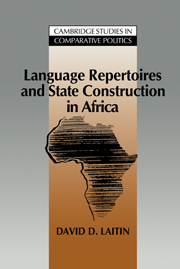Book contents
- Frontmatter
- Contents
- Preface
- PART I LANGUAGE REPERTOIRES AND THE STATE
- 1 Language repertoires as political outcomes
- 2 Three theories explaining language outcomes
- 3 Do language outcomes matter?
- PART II SOCIOLOGICAL AND POLITICAL FORCES DESCRIBED
- PART III STRATEGIC THEORY APPLIED
- PART IV CONCLUSION AND POLICY RECOMMENDATIONS
- Notes
- References
- Index
2 - Three theories explaining language outcomes
Published online by Cambridge University Press: 03 May 2010
- Frontmatter
- Contents
- Preface
- PART I LANGUAGE REPERTOIRES AND THE STATE
- 1 Language repertoires as political outcomes
- 2 Three theories explaining language outcomes
- 3 Do language outcomes matter?
- PART II SOCIOLOGICAL AND POLITICAL FORCES DESCRIBED
- PART III STRATEGIC THEORY APPLIED
- PART IV CONCLUSION AND POLICY RECOMMENDATIONS
- Notes
- References
- Index
Summary
State rationalization, we have seen, implies cultural change. As rulers seek to rationalize rule within their historically contingent boundaries, the people who live within those boundaries will begin to face an altered world. New roads will open up regular contact with people who were previously foreign to them; boundary walls may close off contact, or radically change its nature, with people who were previously considered to be neighbors (Sahlins, 1989). Newly installed religious authorities may demand novel sorts of rituals and prayers; former ritual authorities may be banned from practice. And new languages may be required for petitions, licenses, or simply for bargaining with the tax collector. In light of state-building processes, people may alter their sense of national identity, their religion, and their language. How can we theorize about these changes so that we can understand the conditions under which cultural change occurs?
THE PRIMORDIAL THEORY OF CULTURE
The preeminent cultural anthropologist in the United States, Clifford Geertz, has conceived of the issue of cultural change in new states as a move from “primordial” to “civil” ties, transcended by an “integrative revolution” (Geertz, 1973; chap. 10). By a “primordial attachment,” characteristic of social and political bonds in the new states, Geertz means
one that stems from the “givens” – or, more precisely, as culture is inevitably involved in such matters, the assumed “givens” – of social existence: immediate contiguity and kin connection mainly, but beyond them the givenness that stems from being born into a particular religious community, speaking a particular language, or even a dialect of a language, and following particular social practices. […]
- Type
- Chapter
- Information
- Language Repertoires and State Construction in Africa , pp. 24 - 46Publisher: Cambridge University PressPrint publication year: 1992
- 4
- Cited by

